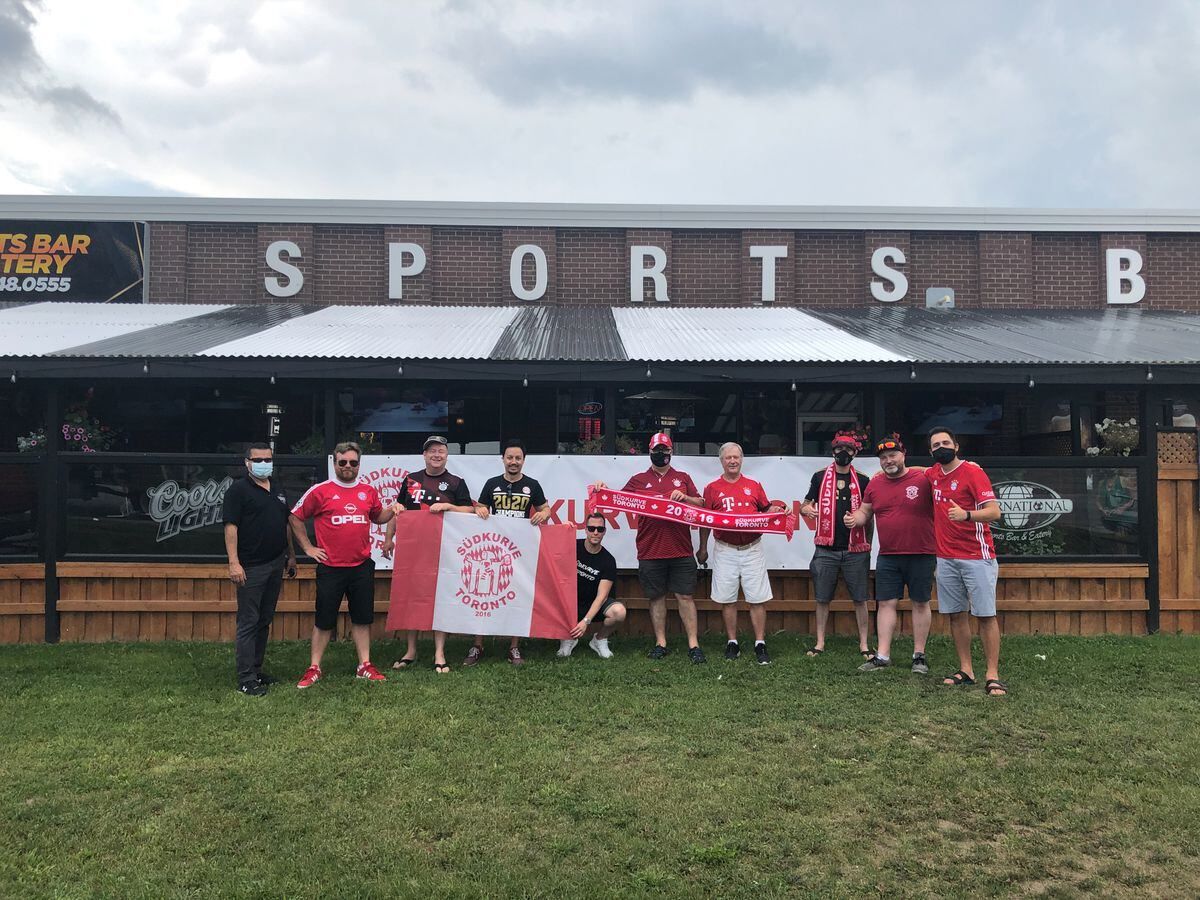On Aug. 23 of last year, Joshua Kimmich, Bayern Munich's central midfielder, received the ball in the right corner outside of Paris Saint-Germain's box. It was the 59th minute of the Champions League final, the biggest stage in European soccer, and the stadium in Lisbon was completely silent. COVID had Europe shut down and fans were not allowed in the stands as Kimmich hit the cross toward the left goal post. The ball sailed above several defenders, right to Bayern's left wing Kingsley Coman, who headed it in the net.
As the goal was scored, 5,700 kilometres away in a sports bar in Mississauga it was beer that sailed over the heads and onto the shirts of more than a hundred Bayern Munich fans. "The whole place erupted. It was euphoria," Jimmy Czikk, one of the founders of Suedkurve Toronto, Canada's biggest Bayern Munich fanclub with around 200 members, said of one of the most memorable nights of his fan life. "I cannot describe the relief after all we have been through; not only with COVID, but with this team."
Almost a year later, the Friday afternoon sun is burning down onto the same Mississauga establishment, the International Sports Bar and Eatery. It was the season opener of the Bundesliga, the top soccer league in Germany. Borussia Moenchengladbach, a team that underperformed last season, faced Bayern Munich. And as it is with any Bayern match (be it on Saturdays at 8.30 a.m. or on Wednesdays or Fridays at 2.30 p.m.), the members of Suedkurve Toronto are here to watch it. (Suedkurve, or south curve in English, is the section of the Munich stadium where where Bayern's rabid fans usually stand to watch the game.)
The Bundesliga is in a culture war right now. Simply, it's traditionalism vs. big money. "A lot of space has arisen between the romantic, working-class idea of soccer in Germany and the actual development," says Fabio Wagner, who works for the Department of Sports Economics and Sociology at the Institute for Sports Science at Johannes Gutenberg University Mainz in Mainz, Germany.
On the one side there is the league and a couple of big clubs such as Bayern, which uses its dominance to push the Bundesliga in a more commercialized, international direction. "For some years now Bundesliga's teams have noticed that the German market is saturated," Wagner says. "That's why Bundesliga teams are pushing into growing markets like Asia or North America."
"Fans are the centre of soccer business. They are bringing the money," Wagner says. Therefore, a team needs to appeal to as many people as possible. Not only in the German market, but worldwide. And how does a team expand in the market? "The easiest thing is: Buy a country's player."
Nine minutes into Friday's game, Alphonso Davies dribbles on the left side of the pitch. The 20-year-old Canadian left back burst onto the world stage in 2020 as an essential part of Bayern's Champions League winning squad and was voted in the FIFPro World11, a recognition chosen by thousands of professional soccer players around the world. But this time he gets stuck between a couple of Gladbach players, who immediately start the counterattack. Eight seconds later, Bayern is trailing 1-0. "NOOOOOO," the Suedkurve members shout. Followed by a "Phonsie, we still love you."
But Wagner also raises a core question, which leads to the other side of the culture war - traditionalists, who don't want the Bundesliga to become a German version of England's Premier League, in which costs are so high that average fans can't afford tickets.
"What even is the right goal for German soccer?" Wagner asks. A lot of fan groups (even Bayern's own top supporters group, the Ultras) strongly oppose the direction the club and league leaders are taking. They fear their teams will be being controlled by billionaires, as is the case in the Premier League, Serie A or in North American sports leagues. The tensions erupted early in 2020, as Bayern was playing Hoffenheim and Munich fans lifted banners cursing the club's owner, Dietmar Hopp.
Hopp, the founder of tech giant SAP, is a symbol for the commercialization of the Bundesliga, as he holds large sway within the league and with his own club. Every team in German soccer has to be majority owned by the club members - a 50+1 rule designed to prevent rich investors from having control over clubs. Many fans are bitter that their own Bayern Munich officials side with Hopp in disputes, rather than with the community members. The protests died down during COVID, but many expect them to fire up again this season.
"Like a lot of our members, I have no direct, but a kind of weird connection, to the club. My dad was a fan and I became one, too, even their games where barely showed here," Czikk says. He recalls how he had to check the newspaper for results. "As you lose the innocence growing up you can't stop being a fan any more. Once a fan, always a fan," Czikk says laughing. The logo of Qatar Airways on his jersey is crossed out, as his own personal protest against Bayern's commercialization.
In the Bundesliga the fans are very integral to the game, Wagner says. "They are not only consumers, they add value to the product of soccer," as well as the choreographies, the chants and the cultures around the club. "Everyone with a TV saw last year, that the games were not the same [without fans in stadiums]." But, Wagner says, "It is no longer credible when clubs like Schalke 04 act like the players come straight out of the coal mine. These are millionaires. There hasn't been a worker for decades. This romance will no longer be able to be brought back."
Czikk takes out his wallet and shows his Bayern Munich member card. "I don't have any illusions. The guys on the top make the decisions. But at least we have a vote on every topic and they need to hear us."
International fanclubs such as Suedkurve Toronto are in the midst of these culture wars. Being fans, they naturally side with the fan groups. If you ask around, the German fan culture is among the reasons why Bundesliga and Bayern are so beloved. But at the same time the fan club is the result of a commercialization strategy German fan groups oppose.
Czikk slides through pictures on his phone. He is part of the hard core, those who travel to games whenever Bayern visits North America. There are regular trips to Munich's Allianz Arena, too. The pictures show Suedkurve members with one Bayern player legend after the other. A cynic would call that customer care. But there is another angle on this.
"Building a community. That's what it's all about," he says. After their sports bar had to close because of COVID, the Suedkurve members donated around $12,000 to Ivan Triana, the owner, to help the bar survive. Triana can't stop grinning when he talks about this. "During the whole time Ryan Tune, [the fan club president], stayed in contact with me and after I was allowed to open again, they were sitting here again for the games at 8.30 a.m.," he recalls. "Are they crazy? Sure. But you kind of have to, follow a club like that."
Before COVID, Suedkurve members were also having Christmas parties, going to the Toronto Oktoberfest, and had joint meetings with the local St. Pauli fan club. "Bayern Munich is just a reason to come together," Czikk says and grins. "But it helps, that the team is half decent."
In the 41st minute, Joshua Kimmich puts the ball down for a corner kick. Again, the ball is sailing above defenders' heads. Bayern's star striker Robert Lewandowski hits the ball mid-air. Twenty Suedkurve guys are jumping up. There it is again, just for a couple of seconds: euphoria.
It will be the last goal scored. The game ends 1-1 and, as after every match, Ivan takes a picture of all the members. Young, old, men, women, different cultural and financial backgrounds. A romantic, and everybody of them is, would call that family.
__________________
The Bundesliga desperately wants new income in order to keep pace with the financial power of Premier League, La Liga, Serie A and with, as a result of that, the ever growing salaries and transfer fees. A look in the transfer balance sheets of all bought and sold players of the major soccer leagues of the past five years supports that:
Premier League: €3.5-billion
La Liga: €384-million
Serie A: €690-million
Bundesliga: €88-millon


